The European Commission has proposed to the European Council a partial suspension of the visa facilitation agreement between Georgia and the European Union. If the Council approves the proposal, Georgian diplomats, officials, and their family members holding diplomatic and service passports will be required to obtain a visa to enter the EU.
News
Trending stories
- 1 Former Prime Minister Garibashvili Sentenced to Five Years in Prison After Plea Deal
- 2 Otar Partskhaladze Charged with Organizing Murder of Businessman Levan Jangveladze
- 3 Shalva Papuashvili Says Georgian Dream Filed Complaint with BBC
- 4 Georgian Dream Party Further Tightens Grants Law, Introducing Up to 6 Years in Prison
“The Georgian people have been protesting against the government’s choice to halt the EU path. Peaceful protests met with police violence. Today we propose visa restrictions for Georgian diplomats.
Our message to the leadership is clear: Stop harming your own people,” European Commission President Ursula von der Leyen wrote on Platform X.
The European Commission stated in a press release that if the agreement is suspended, visa benefits such as shorter processing times, reduced visa fees, and fewer required supporting documents will no longer apply. This suspension will also affect holders of diplomatic and service passports.
The European Commission explained that the proposal is a response to the violent repression of peaceful protesters, politicians, and independent media by the Georgian authorities since November 28.
Additionally, the European Commission highlighted laws adopted by Georgian Dream in May and September that “undermine fundamental rights.” These include the Russian-style law on so-called foreign agents and the law on family values and the protection of minors.
“The protection of fundamental rights, such as the effective implementation of anti-discrimination policies, is a crucial requirement for visa liberalization,” the European Commission emphasized.
The visa facilitation agreement between the EU and Georgia entered into force on March 1, 2011. Since March 2017, Georgian citizens have been able to travel visa-free to EU/Schengen member states.
Commission Vice-President Kaja Kallas stated that sanctions against Georgia remain under consideration and that further measures will continue to be discussed.
“Today we are taking action to hold Georgian authorities accountable for the violent repression of peaceful protests.
This sends a clear message to the Georgian authorities that they cannot repress opposition voices or curtail freedom of expression without consequences.
We have already downgraded political contacts and redirected funding away from the authorities towards the Georgian people, to civil society and independent media. We will continue to stand with the Georgian people on their EU path,” Kallas said.
Executive Vice-President for Democracy and Human Rights, Henna Virkkunen, also commented:
“Today’s proposal is the EU’s resolute reaction to Georgian’s government's serious democratic backsliding, with, amongst others, violent repression against peaceful protesters, political opponents and independent media. Visa liberalisation is key to facilitate mobility between the EU and partner countries around the world. Those who fail to respect fundamental rights should not benefit from this freedom. The EU stands with the Georgian people.”
The EU-Georgia Visa Facilitation Agreement came into force in March 2011, and since March 2017, Georgian citizens have been able to travel visa-free to EU/Schengen member states.















